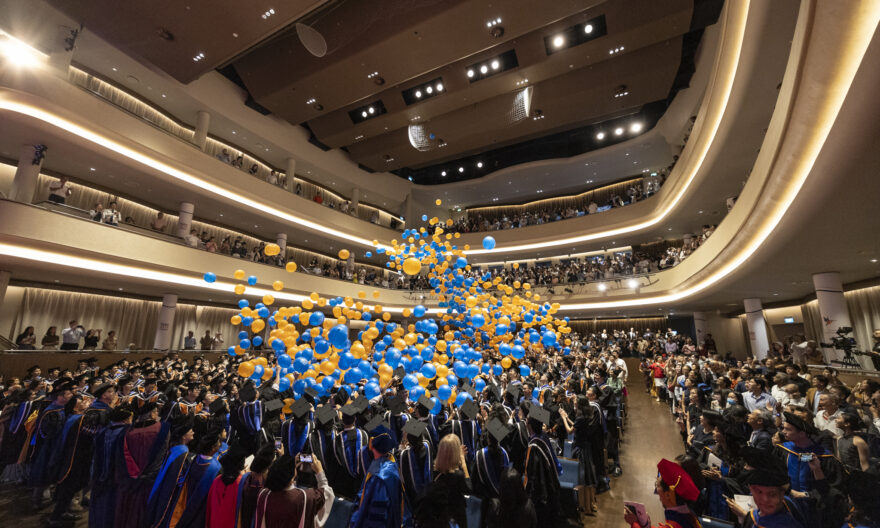Drone Club and The Cosmoscience: exploring the realms of science
Campus life forms a key component of the liberal arts experience at Yale-NUS College. At Yale-NUS, there are over 50 student organisations that encompass a broad range of interest areas, from the arts, sciences, sports and cultural groups to social and community initiatives.
One of the newest student organisations is the Yale-NUS Drone Club which was formed by Yanni Chia, Samen Yasar and Bryan Tan (all from the Class of 2021). The like-minded trio first developed a passion for drones when they took part in the same Week 7 Learning Across Boundaries (LAB) project called “Drones, Biodrones and Information” as first year students.
 From left: Samen Yasar, Yanni Chia and Bryan Tan (all from Class of 2021). Image by Kelly Ng for Yale-NUS College.
From left: Samen Yasar, Yanni Chia and Bryan Tan (all from Class of 2021). Image by Kelly Ng for Yale-NUS College.
“Before that Week 7 programme with Assistant Professor of Science (Life Sciences) Philip Johns, I had neither knowledge nor interest in drones. It was only during the programme that I became fascinated with the technology involved in drones and the wide array of functions they possess. The absence of a drone organisation in the school made me realised that this was a gap to be filled,” explained Yanni, who is the president of the Drone Club.
Today, it has become apparent that drones have gone from the realm of fiction to everyday reality. With the multitude of functions they can perform, these machines possess a huge amount of untapped potential.
“Drones are incredibly useful as they can provide many services. They can be used for aerial photography or videography purposes for school events and to also enhance scientific research methodologies. For example, we can use algorithms to programme drones to move in a square, and on extension, to follow a fixed surveillance route. These make for more efficient mapping and surveillance,” elaborated Yanni.
Participating in the Drone Club also sparked other related interests for some of its founding members.
“I am interested in programming and am looking to major in either Mathematical, Computational and Statistical Sciences or the Life Sciences. As such, working with drones is very relevant to my academic aspirations in college. As a member of the Yale-NUS SCUBA Environments Association, I am also keen on developing an underwater drone to do reef transections for reef conservation work,” shared Samen, who is the secretary of the Drone Club. Reef transections involves mapping out an area of a coral reef in order to survey coral health and marine life of the selected area.
Another group of students have also formed a new publication called The Cosmoscience. The student-run publication aims to provide novel perspectives of the world which integrates scientific knowledge with the arts and social sciences.
Taavishi Jindel (Class of 2020), the Editor-in-Chief of The Cosmoscience, explained the rationale for starting the publication, “Science writing and communication is of vital importance to enable more people to know about the potential and relevance of science. I came up with the idea of The Cosmoscience as a platform to increase the accessibility of the sciences and encourage interdisciplinary discussion.”
The group published its first issue January this year. The unique experience of scientific learning in Yale-NUS can be seen from the diverse range of topics covered in this first issue, from Dark Matter to Religion and Medicine.
Like any other student organisation in its infancy, both the Drone Club and The Cosmoscience cannot evade the teething challenges in their way.
Bryan, who is the vice president of the Drone club, shared, “The backbone of the club is its members. A potential issue we see is the diluted commitment of members who are more involved in other student organisations. To tackle this, we plan to build on the momentum of being a newly-set up club and organise more workshops for both members and the larger student community.”
For The Cosmoscience, engaging the student body in scientific literacy poses a challenge. Anjali Kannangath (Class of 2020), managing editor of the publication, explained, “Though the Common Curriculum advocates for an interdisciplinary focus between both the arts and the sciences, many of our peers sometimes struggle to see how science can be used to answer many of our everyday questions. There is a consequent refusal to engage with the sciences due to intimidation.”
However, Goh Rui Zhe (Class of 2020), who is also managing editor of The Cosmoscience, is optimistic for the future of the publication and its impact on the student community.
 From left: Taavishi Jindel, Goh Rui Zhe and Anjali Kannangath (all from Class of 2020). Image by Saksham Mehrotra for Yale-NUS College.
From left: Taavishi Jindel, Goh Rui Zhe and Anjali Kannangath (all from Class of 2020). Image by Saksham Mehrotra for Yale-NUS College.
“In the pipeline, we have planned a feature collaboration with Yale Scientific Magazine and a scientific academic writing workshop with the Yale-NUS College’s Writer’s Centre. We are also looking to expand our reach to the National University of Singapore. To enhance our content, we hope to collaborate with the Yale-NUS Science Society student organisation to send our writers to external conferences to cover the latest scientific news. I believe that through all these initiatives, more people will gradually see that science is accessible and relevant to how we function as humans. It can influence how we think about our existence, how we structure our policies and so much more.”





